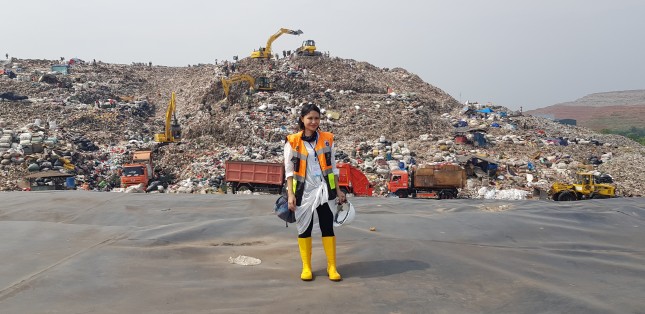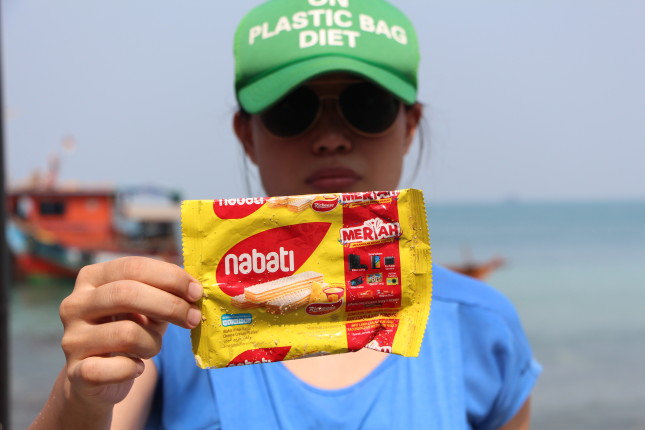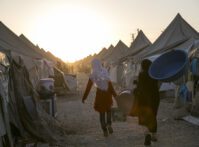-
Aiming for A World Where Everything Is Circular: Q&A with Indonesia Plastic Bag Diet Cofounder Tiza Mafira
“What bothers me is that people tend to look at these rivers and these polluted beaches and think ‘somebody needs to clean it up’—that’s just completely wrong. Because not only is it almost impossible and inefficient, but it’s really not the solution. The solution is prevention,” says Tiza Mafira in the film, Story of Plastic, as she takes a boat trip down the polluted Ci Liwung River that flows through Indonesia’s capital city, Jakarta.
A recent Wageningen University study found that the Ci Liwung River is among the most polluted rivers in the world. The Dutch and Indonesian scientists estimate that 20,000 pieces of plastic waste flow from the river into the ocean per hour. The study also calculated that the annual plastic emissions from the Ci Liwung and the other 12 rivers in Jakarta total 2.1 million kilograms, equal to the weight of 1,000 Tesla Model S cars.
For Tiza, who was born and raised in Jakarta, witnessing her hometown being “conquered” by plastic pollution has been heartbreaking. Tiza has always been an environmental activist, from childhood through her years at Harvard Law School and into her career as a corporate lawyer and now the co-founder and executive director of Gerakan Indonesia Diet Kantong Plastik (GIDKP), The Indonesia Plastic Bag Diet Movement.
The Indonesia Plastic Bag Diet aims to empower and inspire people to stop using plastic bags. Tiza and her colleagues quickly realized that consumers alone could not solve the problem, governments and corporations also needed to act. Thus, Tiza’s group designed a three-pronged effort: providing education and outreach to communities, pushing for better legislation, and building cooperation between plastic producers and other stakeholders.
In 2013, the early days of their movement, they initiated the “#pay4plastics” petition that called on the government to tax plastic bags. Within 3 months, trials were launched in 27 cities across Indonesia. Seven years later, plastic bag taxes have expanded to total bans on plastic bags in 34 Indonesian cities. In the Plastic Robber campaign, volunteers “rob” consumers carrying plastic bags, exchanging them for free usable bags. For individuals who are skeptical about the dangers of plastic bags, the Plastic Bag Diet volunteers arrange “plastic tours,” guiding people to trash-clogged rivers where they listen to stories about the dangers of plastic bags.
We recently spoke with Tiza about her efforts to fight plastic bags waste in Indonesia and her group’s expanded goals to achieve bans of other single-use plastics such as straws and utensils. Tiza triumphantly explained they are not stopping there: “We are aiming for a world where everything is circular.”
China Environment Forum: Can you tell us about the problem your team at Indonesia Plastic Bag Diet Movement is trying to solve?
Tiza Mafira: With respect to “Reduce, Reuse, and Recycle,” the Indonesia Plastic Bag Diet Movement decided early on that we would focus on reduction of single-use plastics. The reason why we focused on plastic bags was we thought of it as a low hanging fruit, which would be an easier target. And from there we can move on to other single-use plastics.
Our initial focuses were education and social awareness, and targeting segments of society like youth and moms who go shopping a lot. But we quickly realized that if we wanted to deliver a massive impact, we would have to target the system, not just segmented behavior. That’s when we started targeting governments and corporations.
CEF: What motivated you to enter the nonprofit sector and start this movement?
TM: I was always interested in environmental issues—I was always the kid who would scold her friends who didn’t put their litter in the trash bin. I studied law and navigated towards environmental law. That became the focus of my graduate study at Harvard.
I went back to the law firm after I graduated. But then I realized that I was on the side that was trying to defend the corporations, and trying to get ground for them to get licenses for businesses. I had to help a client purchase a piece of land. When I went there it was a beautiful paddy field and they wanted to convert it into a cement factory.
I knew that I couldn’t stay there. That’s when I started looking around for non-profit work. Indonesia Plastic Bag Diet was one, and I also decided to do climate policy and climate finance. It was 2014 when I left the law firm. I never looked back and I never regretted it.
CEF: We are impressed by how widespread your work is. How do you make your message audience-friendly?
TM: When we decided we would focus on policy change, we found out early on that we couldn’t abandon the other angles we were working on, the social awareness and corporate campaigns. Because people tend to wait on each other to be the first mover, we targeted all three stakeholders simultaneously and we found champions who were willing to move first in each of those stakeholders’ categories.
Behind the scenes we were working a lot with governments. But up front, what is visible to the public eye is that we are a campaign organization, we do all kinds of fun stuff. Like we put people on a plastic tourism ride on the river to look at how much trash is in the river. We take people to the beach to clean up trash. We collaborated with celebrities to have this educational campaign. We collaborated with a fashion designer last year where her whole theme for that season was plastic trash in the ocean. Since more and more people are talking about it, these campaigns give policymakers the pressure to work faster on the policy side and take it more seriously; because it’s apparent there are social supports for it. That is our strategy around the campaigns.
CEF: The ban on plastic bags in Jakarta was launched on July 1st 2020. What is your feedback for the performance so far? What does the future direction of the Plastic Bag Diet look like?
TM: There were a lot of challenges leading up to that because COVID-19 hit right before July. We faced pressure from the industry to delay the ban, who claimed that plastics are needed especially during COVID. The fact that the government managed to issue the ban as scheduled was a victory. We did a survey recently with Jakarta citizens and 90 percent of the respondents said that they now reuse their own bags in the supermarket. That’s exactly the kind of behavior change we are looking for, and that is the point of the law—to get into the habit of reusability.
As for what’s next, we are galvanizing the cities that are already onboard and talking to them about the other single-use plastics, such as styrofoam, straws, cups, and utensils. Single-use plastics need to be phased out. We are aiming for a world where everything is circular. Every product should be designed as valuable enough to be recycled. Single-use plastic bans are paving the way for that transition.
This blog is part of a new Closed Loop Innovator Series, profiling stories of women around the world innovating in business, civil society, and science to reduce plastic waste pollution. A condensed version will appear in the upcoming China Environment Forum publication, InsightOut: Closing the Loop on Plastic Waste in Indonesia.
Ruyi Li is a researcher at Wilson Center’s China Environment Forum. Her recent focuses are waste management in Asia and low carbon transition in China. She graduated from Johns Hopkins University (SAIS) with an MA in Energy, Resources & Environment and International Economics.
Eli J. Patton is a researcher at Wilson Center’s China Environment Forum. His research focuses on the environmental and security aspects of China’s FDI. Eli will graduate from the George Washington University with an MA in Asian Studies this spring.
Sources: The Conversation, Diet Kantong Plastik (Plastic Bag Diet Movement), IOP Science, The Story of Stuff Project, Waste4Change
Lead Photo Credit: Tiza standing in front of a waste management site, courtesy of Tiza Mafira.
 A Publication of the Stimson Center.
A Publication of the Stimson Center.










